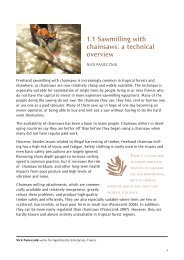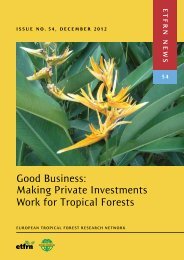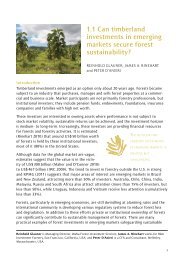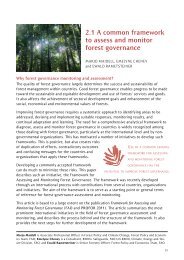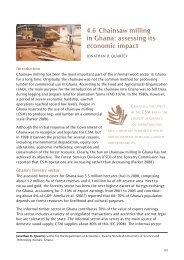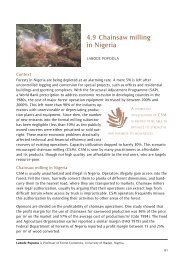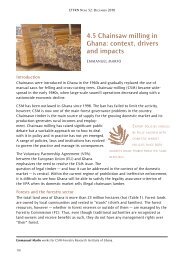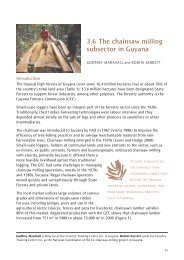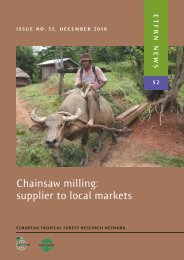Chainsaw milling: supplier to local markets - European Tropical ...
Chainsaw milling: supplier to local markets - European Tropical ...
Chainsaw milling: supplier to local markets - European Tropical ...
Create successful ePaper yourself
Turn your PDF publications into a flip-book with our unique Google optimized e-Paper software.
3.4 FoREsT commuNiTiEs aND lEgal TimbER iN ThE EcuaDoRiaN amazoN<br />
asokanus was able <strong>to</strong> negotiate an agreement with a timber processor for the sale of<br />
seique (Cedrelinga cateniformis). The price was as much as 25% higher than the market<br />
price since the buyer demands proven legal timber.<br />
conclusions<br />
in general, the forest in Ecuador has been and is still considered <strong>to</strong> be a source of immediate<br />
income by rural people and an exploitable resource <strong>to</strong> meet the national timber demand.<br />
The current policy approach almost entirely overlooks the need for sFm <strong>to</strong> obtain<br />
a long-term yield and secure environmental services. This is<br />
evident because of the small area being well-managed and<br />
the lack of promotion of forest conservation.<br />
Forest moni<strong>to</strong>ring is recommended in order <strong>to</strong> prevent<br />
further losses due <strong>to</strong> forest degradation and conversion.<br />
Furthermore, the forest authority — in collaboration with<br />
other institutions, such as the national Development bank 6<br />
— should design credit lines <strong>to</strong> improve the harvesting and<br />
sawing techniques used by small-scale millers and <strong>to</strong> offer<br />
micro-credit <strong>to</strong> harvest legal timber. These measures might<br />
prove <strong>to</strong> be even more effective when planning national measures related <strong>to</strong> reducing<br />
Emissions from Deforestation and Forest Degradation (rEDD).<br />
one question always stands out: why is illegal timber more attractive than legal timber?<br />
our findings reveal some possible answers:<br />
• the production of legal timber is more expensive because of tax payments and the<br />
requirement <strong>to</strong> follow formal procedures;<br />
• legal timber does not receive a fair price because of the lack of demand for it;<br />
• the market accepts and often prefers illegal timber because of greater demand and<br />
the scant risk of being caught;<br />
• the prevailing mean of production, the chainsaw, does not require formally<br />
established operations and financial moni<strong>to</strong>ring, as the scale is small and little<br />
capital is involved; and<br />
• the legal regulation does not address small-scale producers who cut only a few trees<br />
per year and chainsaw-mill them.<br />
The solution <strong>to</strong> the problem of bad forest management and poor rate of recovery when<br />
marketing legal timber should be developed according <strong>to</strong> the ideas of <strong>local</strong> organizations,<br />
in order <strong>to</strong> have their acceptance. however, most representatives we contacted had only<br />
vague and partial ideas for improvements, most of which did not include <strong>milling</strong> technology.<br />
Freehand chainsaw <strong>milling</strong> is seen as the only feasible way <strong>to</strong> produce sawn timber.<br />
arguments that the timber quality is bad, the dimensions vary <strong>to</strong>o much and that much<br />
of the timber is lost during the process are countered with statements about the lack of<br />
capital and the forest’s inaccessibility <strong>to</strong> larger equipment. in addition, chainsaws are<br />
widely available.<br />
83



